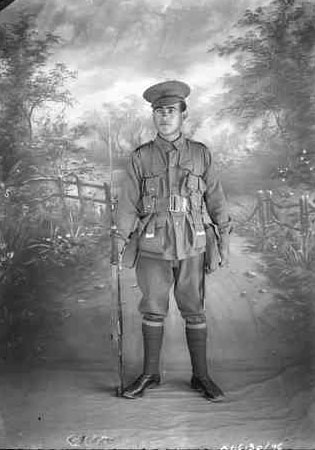Edward Lakovsky
| Alias | Lake |
|---|---|
| Russian spelling | Эдуард Лаковский |
| Born | 24.05.1893 |
| Place | Iuzovo, Ekaterinoslav, Ukraine |
| Ethnic origin | Jewish |
| Religion | Salvation Army |
| Father | Tom Lakovsky (Lachovsky) |
| Mother | Pasha Lakovsky (nee Shaeffer) |
| Family | Wife Hilda Isabel Lakovsky (Lake, nee Hooper), married in Melbourne 15.12.1917; children with surname Lake: Leonard Edward (1919-1986), Raymond Max (1920-1989), David Emerson (1923-2012), Isabel Ada Ellen (1924-1991), Leah Thelma (1928-2004), Pasha Hilda (1929-2008), Cyril (1934-1934), Bonny, Gertrude |
| Contacts | Brother David Lakovsky; sister Zillah Lakovsky, wife of Jack Kanaef |
| Residence before arrival at Australia | Lived in Odessa, Ukraine |
| Arrived at Australia |
from Odessa, Ukraine on 28.07.1903 per Gera disembarked at Fremantle, WA |
| Residence before enlistment | Perth, Kalgoorlie, Broken Hill |
| Occupation | 1915 labourer; after the war was employed by Victorian Railways; 1917 letter carrier, 1942 boot repairer |
| Naturalisation | 1915 |
| Residence after the war | Melbourne |
| Died | 11.09.1977 Creswick, Victoria |
Service #1
| Service number | 1974 |
|---|---|
| Enlisted | 14.01.1915 |
| Place of enlistment | Oaklands, SA |
| Unit | 10th Battalion |
| Rank | Private |
| Place | Egypt, 1915 |
| Final fate | RTA 31.08.1915 |
| Discharged | 12.06.1916 MU |
Materials
Naturalisation (NAA)
Digitised father's naturalisation (NAA)
Digitised service records (NAA)
Digitised Embarkation roll entry (AWM) (Likovosky)
Army payfile (NAA)
Personal case file (NAA)
Family tree on Ancestry.com
Blog article
Newspaper articles
Larceny of a bicycle. - Barrier Miner, Broken Hill, 16 February 1911, p. 4.
Welcome Home. - Barrier Miner, Broken Hill, 31 July 1919, p. 1.
Mr. Thomas Lakovsky. - The Hebrew Standard of Australasia, Sydney, 13 March 1931, pp. 3-4.
From Russian Anzacs in Australian History:
The Lakovsky, Lebovich and Rappeport families from southern Russia were among those that did continue with their small businesses in Australia. They came to Western Australia at the end of the 19th century and their sons would grow up just like other ordinary Australian city boys -- with the same pursuits and interests, and undergoing the same military training compulsory for Australian boys at the time. The difference for these Jewish boys was that, in Australia, they had the benefits of a better start in life, and a better general education, than would have been their lot in Russia. The question of their identity was probably of little concern for most of this younger generation: for them, Russianness and Jewishness were already giving way to a sense of being Australian -- or being 'British'.
Gallery

Edward Lakovsky
State Library of South Australia, B 46130/96
 Russian Anzacs
Russian Anzacs